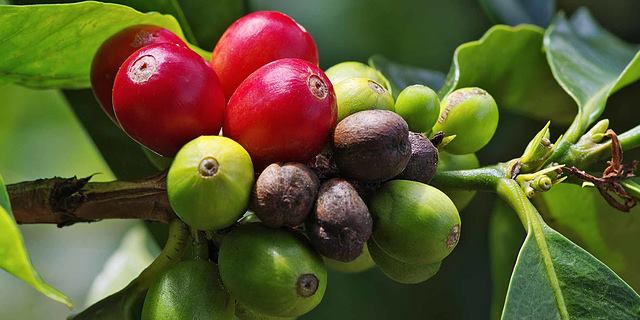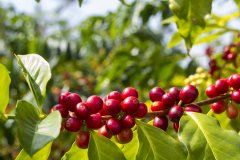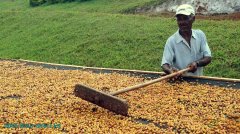Introduction of Dasaya treatment Plant of Purple Fengling in Guji production area of Ethiopia

For professional baristas, please follow the coffee workshop (Wechat official account cafe_style)
The original text of Dasaya in Ethiopia is Dawala Samayawi, which means purple wind chimes!
Just as Yega Xuefei became widely known after she became famous, she gradually became an independent producing area. Guji was separated into a new production area by the Ethiopian Commodity Exchange (ECX) in 2010. The Guji region, located in the southeast of Yegashefi, is adjacent to the Sidamo and Gaide areas. It is an area with complex topographical changes such as towering mountains, highlands, plateaus, valleys and plains. The geology of this area belongs to the nutrient-rich black soil (Vertisol), the depth of the soil is nearly two meters, and the average elevation is more than 1800 meters. The significant temperature difference between day and night created by geographical characteristics makes the local area have various local conditions for producing high-quality coffee. The biggest advantage of this place is that the soil vitality is maintained through the circulation of natural organic matter, using the withered leaves or litter of surrounding trees, plant residual roots and so on as natural fertilizer.
Local coffee production comes from individual small farmers. When the production season comes, the ripe berries around the home are picked and sent to the treatment plant, and placed on a well-ventilated African scaffolding to control the temperature and fermentation degree. After removing the pulp, the water content is reduced to between 11.5% and 12%. When the post-processing is completed, it is exported through the competitive bidding system of ECX.
Gujiso's coffee beans have become increasingly well-known in recent years, and recently the closely watched Nekisse launched by Ninety Plus ®and the Derar Ela launched by its sub-brand Level Up both originated in this producing area.
About Ethiopia
A variety of coffee cultivation methods can be found in Ethiopia, from wild coffee forests and semi-developed land to traditional small farms to modern estates. About 50% of the coffee trees are planted at an average altitude of about 1500 meters. The whole of Ethiopia can be divided into nine major coffee producing areas: Sidamo, Yega Sheffield, Hara, Lim, Rykamput, Gemma, Ibedo, Tibe, Bebeca and so on.
Flavor description:
Apricot, raspberry, green malic acid, grape
Producing area / Guji
Variety / Ethiopian native species
Ethiopian Heirloom
Treatment / solarization
Planting altitude / 1900-2100 m
Baking degree / shallow baking
Important Notice :
前街咖啡 FrontStreet Coffee has moved to new addredd:
FrontStreet Coffee Address: 315,Donghua East Road,GuangZhou
Tel:020 38364473
- Prev

Ethiopia-Gaideo-Kochel Kochere production area introduces washed Yega Xuefei G1 coffee
Professional baristas please follow the coffee workshop (Wechat official account cafe_style) Kochere has always been sought after for its excellent flavor including citrus notes, core fruits and charming tea aromas. It has half of the original forest coverage, up to 15 meters thick red brown clay, an average altitude of more than 2000 meters, etc., which is suitable for the excellent geography of coffee cultivation.
- Next

Introduction to the characteristic planting Environment of Shenmu Manor, the second Runner-up of COE in South Minas, Brazil
Professional baristas Please follow Coffee Workshop (official Wechat account cafe_style) Shenmu Manor is located in the mountainous area of South Minas, which is about 1200 meters above sea level, with an average annual temperature of about 19 degrees and rainfall of about 1600 mm. Minas is one of the most important and well-known producing areas in Brazil. The local conditions and excellent weather of the manor make it suitable for growing boutique coffee.
Related
- Detailed explanation of Jadeite planting Land in Panamanian Jadeite Manor introduction to the grading system of Jadeite competitive bidding, Red bid, Green bid and Rose Summer
- Story of Coffee planting in Brenka region of Costa Rica Stonehenge Manor anaerobic heavy honey treatment of flavor mouth
- What's on the barrel of Blue Mountain Coffee beans?
- Can American coffee also pull flowers? How to use hot American style to pull out a good-looking pattern?
- Can you make a cold extract with coffee beans? What is the right proportion for cold-extracted coffee formula?
- Indonesian PWN Gold Mandrine Coffee Origin Features Flavor How to Chong? Mandolin coffee is American.
- A brief introduction to the flavor characteristics of Brazilian yellow bourbon coffee beans
- What is the effect of different water quality on the flavor of cold-extracted coffee? What kind of water is best for brewing coffee?
- Why do you think of Rose Summer whenever you mention Panamanian coffee?
- Introduction to the characteristics of authentic blue mountain coffee bean producing areas? What is the CIB Coffee Authority in Jamaica?

